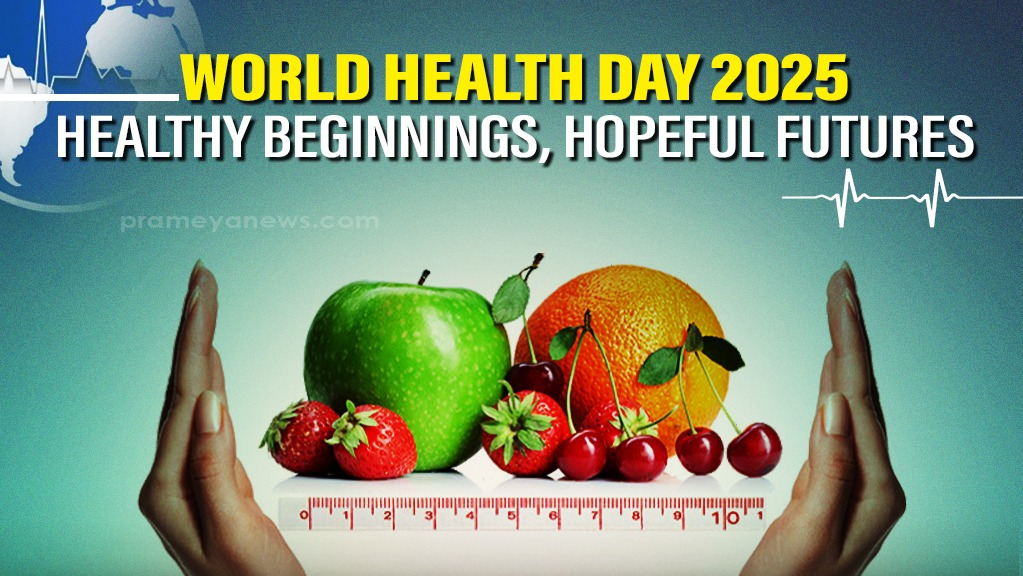World Health Day 2025: Healthy Beginnings, Hopeful Futures
In our increasingly health-conscious world, particularly in the years following the global pandemic, the importance of well-being in all its facets has never been clearer. Health profoundly impacts every aspect of our lives, influencing not just longevity but also our overall happiness and potential. Recognizing this, the global community turns its attention each year on April 7th to World Health Day, an occasion dedicated to raising awareness and mobilizing action around critical health issues. As we look towards April 7, 2025, the chosen theme, "Healthy Beginnings, Hopeful Futures," places a vital spotlight on the foundational importance of maternal and newborn health.
About World Health Day
World Health Day holds historical significance, the day the constitution of the World Health Organization (WHO) came into force in 1948, with the first observance in 1950. Established as a specialized agency of the United Nations, the WHO was created to tackle significant global health challenges and operate with a degree of autonomy to address public health needs effectively.
Since its inception, World Health Day has served a dual purpose: to celebrate the founding of the WHO and, perhaps more importantly, to draw worldwide attention to a specific theme highlighting a priority area of global health concern. Over more than five decades, this annual observance has successfully brought critical issues to the forefront of public discourse, including mental health, the importance of maternal and child care, and the health impacts of climate change. The activities and discussions sparked by World Health Day often extend beyond the single date, fostering sustained focus and action on these vital topics.
2025 Theme: "Healthy Beginnings, Hopeful Futures"
For 2025, the World Health Organization has designated "Healthy Beginnings, Hopeful Futures" as the central theme. This theme highlights the fundamental principle that the health and well-being experienced during pregnancy, childbirth, and the early newborn period lay the groundwork for an individual's lifelong health and potential. It recognizes that ensuring mothers and their newborns survive and thrive is not just a health issue but a matter of human rights and socioeconomic development.
The campaign surrounding this theme issues a clear call to action for governments, healthcare organizations, communities, and individuals worldwide. It urges increased investment in high-impact, evidence-based initiatives specifically designed to improve maternal and newborn health outcomes. The core objectives are to significantly reduce preventable maternal and newborn deaths and to actively promote practices and policies that support the long-term health and survival of both mother and child. This includes advocating for quality prenatal care, skilled attendance at birth, essential postnatal care, access to nutrition, and supportive environments for new families.
Why This Theme Matters
Focusing on maternal and newborn health is paramount because this period represents a unique window of opportunity with profound, lasting consequences. A healthy start in life, beginning in the womb, significantly influences a child's physical growth, cognitive development, and susceptibility to chronic diseases later in life. Healthy mothers are more likely to have healthy babies, and healthy babies have a greater chance of growing into healthy, productive adults.
Investing in maternal and newborn care yields substantial returns, contributing to stronger families, more resilient communities, and more prosperous societies. Conversely, neglecting this critical phase leads to tragic, often preventable, loss of life and perpetuates cycles of poor health and poverty. The "Healthy Beginnings, Hopeful Futures" theme emphasizes that prioritizing the health of mothers and newborns is an investment in the future potential of entire generations.
Nutritional Foundations for a Hopeful Future
A cornerstone of ensuring healthy beginnings is optimal nutrition during pregnancy and the postpartum period. As the article highlights, quoting PratikshaKadam, Chief Dietitian at KokilabenDhirubhaiAmbani Hospital, Navi Mumbai, this is a time of significant physical and emotional demand where the mother's body works diligently to protect and nourish both herself and her developing baby.
The familiar phrase "eating for two" requires clarification – it emphasizes nutrient quality over quantity. A wholesome, balanced diet rich in essential vitamins, minerals, and antioxidants is key. Good nutrition during this phase, Kadam explains, can help mitigate common risks such as anemia, infections, and fatigue. It directly supports the baby’s crucial brain, bone, and immune system development. Furthermore, adequate nutrition aids in the mother's postpartum recovery and supports successful lactation. Key nutrients like iron, calcium, vitamin C, and probiotics play vital roles in boosting energy, reducing inflammation, and enhancing milk quality.
Superfoods: Powering Maternal and Newborn Well-being
Incorporating nutrient-dense "superfoods" into daily meals can be an effective strategy for expectant and new mothers to meet their increased nutritional needs. These foods offer a concentrated source of beneficial compounds that support both maternal health and fetal development. Based on expert recommendations cited in the article, here are eight examples:
- Citrus Fruits (Oranges, Lemons, Sweet Limes): Rich in Vitamin C, they are crucial for boosting the immune system and enhancing the absorption of iron from other foods, helping combat fatigue and prevent deficiencies.
- Garlic: Contains allicin, known for its natural antibacterial and antiviral properties, offering a flavorful way to potentially bolster defenses when added to meals like soups and dals.
- Ginger: Widely recognized for easing nausea (morning sickness) and aiding digestion, ginger also possesses anti-inflammatory properties beneficial for overall health.
- Spinach: A powerhouse of iron, folate, Vitamin A, and Vitamin C. Iron supports red blood cell production, while folate is vital for the baby’s neural tube development.
- Almonds: Provide Vitamin E, healthy fats, and energy. Vitamin E supports skin health and elasticity, while healthy fats are important for fetal brain development.
- Turmeric: Its active compound, curcumin, has potent anti-inflammatory and antioxidant properties, potentially aiding in healing and recovery, especially postpartum.
- Yogurt (Natural): An excellent source of probiotics for gut health and digestion, and packed with calcium, essential for bone strength in both mother and baby.
- Blueberries: Loaded with antioxidants and Vitamin C, they help combat oxidative stress and support maternal energy levels.
These examples illustrate how targeted food choices can significantly contribute to the "Healthy Beginnings" emphasized by the World Health Day 2025 theme.
Embracing Healthy Beginnings
World Health Day 2025, with its theme "Healthy Beginnings, Hopeful Futures," serves as a powerful reminder of the profound impact the earliest stages of life have on future well-being. By focusing global attention and resources on improving maternal and newborn health, we invest not only in saving lives but also in nurturing potential and building healthier, more equitable societies. From advocating for better healthcare access to promoting good nutrition and supportive environments, ensuring a healthy start for every mother and child is a collective responsibility that promises a more hopeful future for all.



















































